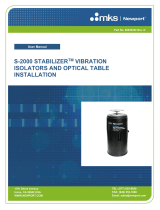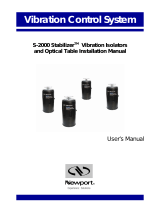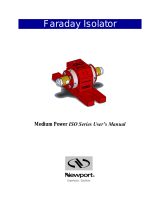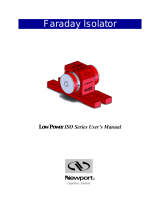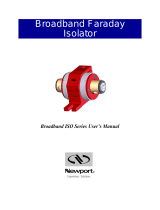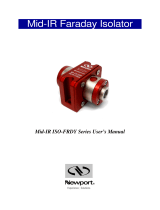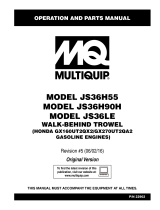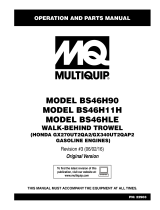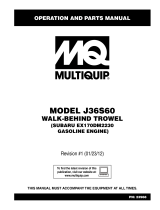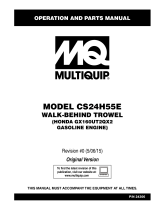Page is loading ...

VIBe™
Vibration Isolation Platform
Users Manual

ii
Warranty
Newport Corporation warrants that this product will be free from defects in
material and workmanship and will comply with Newport’s published
specifications at the time of sale for a period of one year from date of
shipment. If found to be defective during the warranty period, the product
will either be repaired or replaced at Newport's option.
To exercise this warranty, write or call your local Newport office or
representative, or contact Newport headquarters in Irvine, California. You
will be given prompt assistance and return instructions. Send the product,
freight prepaid, to the indicated service facility. Repairs will be made and the
instrument returned freight prepaid. Repaired products are warranted for the
remainder of the original warranty period or 90 days, whichever first occurs.
Limitation of Warranty
The above warranties do not apply to products which have been repaired or
modified without Newport’s written approval, or products subjected to
unusual physical, thermal or electrical stress, improper installation, misuse,
abuse, accident or negligence in use, storage, transportation or handling. This
warranty also does not apply to fuses, batteries, or damage from battery
leakage.
THIS WARRANTY IS IN LIEU OF ALL OTHER WARRANTIES,
EXPRESSED OR IMPLIED, INCLUDING ANY IMPLIED WARRANTY
OF MERCHANTABILITY OR FITNESS FOR A PARTICULAR USE.
NEWPORT CORPORATION SHALL NOT BE LIABLE FOR ANY
INDIRECT, SPECIAL, OR CONSEQUENTIAL DAMAGES RESULTING
FROM THE PURCHASE OR USE OF ITS PRODUCTS.
First printing 2009
© 2009 by Newport Corporation, Irvine, CA. All rights reserved. No part of
this manual may be reproduced or copied without the prior written approval
of Newport Corporation.
This manual has been provided for information only and product
specifications are subject to change without notice. Any change will be
reflected in future printings.
Newport Corporation
1791 Deere Avenue
Irvine, CA, 92606 USA
Part No. 90047912 Rev. A

iii
Table of Contents
Warranty ................................................................................................. ii
Table of Contents .................................................................................. iii
List of Figures ....................................................................................... iv
Section 1 – General information 5
1.1 Introduction ...................................................................................5
1.2 Getting Started ...............................................................................6
1.3 Unpacking and Inspection .............................................................6
1.4 Safety Considerations ....................................................................6
1.5 System Placement ..........................................................................6
1.6 Warranty Information ....................................................................6
2 Section 2 – Unpacking and Assembly 7
2.1 Unpacking and Inspecting .............................................................7
2.2 Assembling and Installing the VIBe System .................................7
2.2.1 Assembling the ViBe System ............................................7
2.2.2 Aligning and Leveling the VIBe System ...........................9
2.3 Maintenance ................................................................................11
2.3.1 Cleaning ...........................................................................11
Section 5 – Factory Service 12
2.4 Obtaining Factory Service ...........................................................12
3 Service Form 13

iv
List of Figures
Figure 1 Vibe components. The shape of the baseplate and the number of
isolators may differ depending on your system configuration. ....... 7
Figure 2 IB isolator assmebly ........................................................................ 7
Figure 3 Mounting the VIB-BRKT to the base plate .................................... 8
Figure 4 Installing the IB isolator into the VIB-BRKT................................. 8
Figure 5 Instrument placed centered on the VIBe system............................. 8
Figure 6 IB isolator alignment diagram ........................................................ 9
Figure 7 IB isolator height adjustment ........................................................ 10
Figure 8 Gap tool dimension and measurement location ............................ 10
Figure 9 Gap tool width measurement showing under loaded condition .... 10
Figure 10 Gap tool thickness measurement showing overloaded condition . 11
Figure 11 Gap tool thickness measurement showing correct preload. .......... 11

5
Section 1 – General information
1.1 Introduction
The VIBe vibration isolation baseplate from is a compact, effective and easy-
to-use platform that significantly reduces effect of disturbing environmental
vibrations on sensitive instruments such as microscopes, inspection or
analysis equipment. All VIBe units feature a black powder-coated steel plate
and patented mechanical isolators that provide both vertical and horizontal
vibration isolation, there are no air lines, compressors or other accessories
needed to provide effective isolation performance.
The Vibe is available in four standard shapes, two rectangular and two
triangular, that have been designed to satisfy the widest range of application
needs. The two rectangular platforms come in 12”x18” and 18”x24” sizes
and can be equipped with isolator bearings to support payloads from 5lbs to
over 350lbs. The triangular models have been designed specifically to
accommodate a large assortment of microscope footprints from all leading
manufacturers.
At the heart of Newport’s VIBe are the IB isolator bearings which are
available in discrete payload ranges as identified by their part number. For
very light instruments, model IB-1018 isolates total payloads from 10lbs to
18lbs per bearing and for heavy instruments IB-50100 isolates total payloads
from 50lbs to 100lbs per bearing. In total, Newport offers six models of IB
bearings that effectively cover a load range from 10lbs to 100 lbs. This
allows users to configure the proper size platform and bearings in the
required locations on the baseplate to support and isolate their instrument,
even if the load is not uniform, as in the case of microscopes which are
typically heavier in the rear by as much as 50%.
Each bearing is a self-contained unit that provides both vertical and
horizontal isolation for that specified load range. The isolators feature a
6.7Hz vertical resonance frequency that begins isolating at 9Hz and a
horizontal resonance of 6.2Hz with isolation beginning at 9Hz. This is
sufficient performance to eliminate more than 85% of vibration noise seen

6
within typical laboratories. The IB bearings attach to the VIBe baseplate
using specially designed brackets that feature a threaded aperture to allow
leveling adjustment of the VIBe baseplate.
1.2 Getting Started
Please read this instruction manual thoroughly before assembling the
isolation system. The individual components have been assembled at the
factory and require only final system assembly and performance adjustment.
1.3 Unpacking and Inspection
The components of your VIBe are packed in individual, labeled boxes.
Carefully inspect all components for shipping damage.
Report any shipping damage immediately to Newport and the shipping
company.
1.4 Safety Considerations
The following terms are used in this manual that relate to your safety.
WARNING
Warning is used to indicate dangers that could result in personal
injury.
CAUTION
Caution is used to indicate situations that may result in damage
to components of your Newport Vibration Control System.
1.5 System Placement
To ensure optimal performance from your VIBe, it should be located on a
level surface. Uneven mounting surfaces may cause difficulty if their
irregularity is outside of the adjustment range of the IB isolator.
1.6 Warranty Information
Warranty information may be found on the page preceding the Table of
Contents in this manual. Should it become necessary to exercise the
warranty, contact your Newport representative to determine the proper course
of action. Newport Corporation maintains offices throughout the United
States and other locations worldwide. Refer to the back cover of this manual
for the addresses and telephone numbers of these offices.

7
2 Section 2 – Unpacking and
Assembly
2.1 Unpacking and Inspecting
Carefully unpack and remove the VIBe baseplate, brackets and isolators from
their boxes. Inspect all of the parts for shipping damage. You will find a
black powder coated VIB base plate, mounting brackets with two bolts per
bracket and IB isolators with a rubber O-ring (see figure 1).
Figure 1 Vibe components. The shape of the baseplate and the number of isolators may
differ depending on your system configuration.
2.2 Assembling and Installing the VIBe System
2.2.1 Assembling the ViBe System
1. Place the O-ring around the top of the VIB and secure it around the
bearing just below the threaded portion of the IB isolator. (see figure 2).
Figure 2 IB isolator assembly
O-ring
threads

8
2. Bolt the mounting brackets to the base plate.
Figure 3 Mounting the VIB-BRKT to the base plate
3. Next, screw the IB bearings into the brackets completely and place the
VIBe in the desired location.
Figure 4 Installing the IB isolator into the VIB-BRKT
4. Finally, place your instrument onto the base plate and adjust the IB
bearing at the lowest corner if necessary to level the platform.
Figure 5 Instrument placed centered on the VIBe system

9
2.2.2 Aligning and Leveling the VIBe System
2.2.2.1 Check the VIBs for proper alignment.
The bottom portion of the bearing must be vertically aligned with the top
portion. (The VIP can be displaced from side to side. When you push the VIP
to the side with your hand, the top portion of each VIB will move relative to
the bottom portion. When you remove the lateral force, the VIBs will re-
center.) You may visually inspect the VIBs to see if the alignment is correct.
Simply look at the sides of the VIBs and feel with your fingers to determine
if they are aligned. If the alignment is not correct, move the bottom portion of
the VIBs with your fingers to correct the alignment. (See Illustration No. 1)
Figure 6 IB isolator alignment diagram
2.2.2.2 Leveling the Platform.
Various microscope configurations place more weight on one side or end of
the platform than another, compressing one bearing more than another and
thus causing the platform to sit un-level. In this case, determine which
bearing is deflected more than the others and turn the top half of the bearing
clockwise relative to the threads in the clip that is bolted to the plate. It may
be necessary to lift upwards on the platform (though not lifting the VIB off
the table) to reduce the pressure on the threads and make it easier to turn the
threaded cap. This action will raise the plate relative to the tabletop and level
the platform.
WARNING
Warning: Do not slide platform, or move platform
once a load has been placed and the bearings are
compressed. Damage may occur to the bearings.

10
Figure 7 IB isolator height adjustment
2.2.2.3 Preloading the Isolators
The IB bearings are shipped with a special gap tool that is used to verify that
the isolators are properly loaded. This gap tool measures 0.56” wide by 0.1”
thick and is used to determine that the gap in the isolator is more than 0.1”
but less than 0.56”.
Figure 8 Gap tool dimension and measurement location
If the gap tool width fits into the gap as shown the isolator does not have
sufficient loading and will not isolate properly.
Figure 9 Gap tool width measurement showing under loaded condition
0.56”
0.10”
2” (51mm)
The gap tool is used to check this gap

11
If the tool thickness does not fit into the gap the isolator is overloaded.
Figure 10 Gap tool thickness measurement showing overloaded condition
In either case a different load range IB bearing is needed in that location.
Please be sure to verify that the appropriate load range isolators are installed
in the proper location on the VIBe base plate. In some applications this may
be as easy as switching isolator locations or adjusting the instrument on the
platform.
Figure 11 Gap tool thickness measurement showing correct preload.
2.3 Maintenance
Newport VIBe systems require little maintenance. No periodic maintenance
is required.
2.3.1 Cleaning
Newport isolators are painted, powder coated, or zinc plated steel. This
coated material is relatively corrosion resistant. It may be cleaned by
applying non-abrasive liquid household cleaner to a rag and wiping the
isolator. Avoid abrasive cleaners.

12
Section 5 – Factory Service
2.4 Obtaining Factory Service
To obtain information concerning factory service, contact Newport
Corporation or your Newport representative. Please have the following
information available.
1. Model number.
2. Purchase order number.
3. Complete description of the problem.
If components are to be returned to Newport Corporation, you will be given a
Return Number, which you should reference in your shipping documents.
Please fill out the service form located on the next page, and have the
information ready when contacting Newport Corporation. Include the
completed service form with any parts or components that are returned.

13
3 Service Form
Vibration Control Products
Name RETURN AUTHORIZATION #
Company (Please obtain prior to return of item)
Address
Country Date
P.O. Number Phone Number
Item(s) Being Returned:
Model # Serial # (or manufacturing date)
Description
Reason for return of goods (please list any specific problems)
Please Describe the Problem:
(Attach additional sheets as necessary)
Where is the Equipment Installed?
(factory, controlled laboratory, out-of-doors, etc.)
Any additional information. (If special modifications have been made by the
user, please describe below).
/
